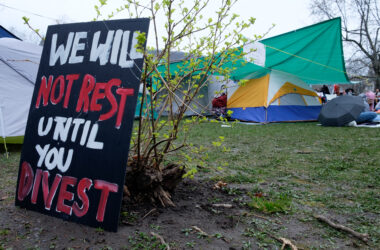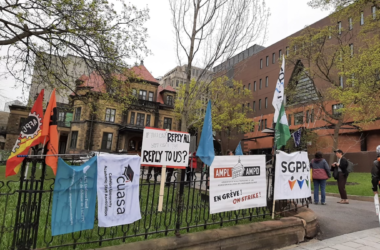This Sunday marked the tenth anniversary of the September 11th terrorist attacks on the World Trade Center and the Pentagon. The attacks shocked America, Canada, and the world, and even now maintain a deep, palpable psychological grip on many.
While the attacks happened hundreds of miles away, Canada and the McGill community still felt their effects. Some experienced the attacks on television or through the news; others experienced them first hand. Jamie Merrell, from New York, like many McGill students, was only in elementary school at the time. Despite this, her memories of the day are vivid.
“My whole class was outside for recess when both of my parents came to pick me up,” Merrell recalls.
“It was still early, so the school had not announced anything to the students yet. When my parents told me what had happened, I remember feeling upset and confused.”
Merrell’s cousin worked in the World Trade Center on 9/11. Even ten years later, she feels strongly about his experience.
“He saw the first plane hit out of his office window,” she said.
“Everyone in his office was instructed to stay in the building, but he said he knew that he had to get out. He took the stairs and convinced everyone he could to come with him. He was still in the building when the second plane hit. He risked his own life to help save those of others.”
While Merrell’s cousin survived, she feels sorry for the thousands of others who were not so lucky. She remembers Sept. 11, both for the bravery showed by many on that day and for the lives lost.
Another member of the McGill community, political science Professor Stephen Saideman, was working at the Pentagon at the time. He remembers first hearing about the attacks at the World Trade Center before the Pentagon was attacked.
“I … was told to watch TV and it was immediately clear [the attacks] were no accident because of the way the planes hit and the way [the towers] collapsed, and so immediately [those at the Pentagon] thought ‘terrorism’ and so there was a meeting in Washington.”
Saideman was on a bridge between Virginia and Washington when he began to hear radio reports that his own place of work had been attacked. He described the sudden changes to the Pentagon that came in the aftermath of the attacks. Aside from a changing of focus at the Pentagon and changes in policy, parts of daily life changed as well.
“Instead of civilian guards, there were military ones,” Saideman said.
“They closed the metro stop to the Pentagon and you had to walk all around one side which added considerably to the commute.”
The Pentagon Metro station has since reopened, but it now does not allow direct access to the Pentagon as it once did.
Canada faced challenges as a result of the terror attacks. In a letter written to Prime Minister Stephen Harper for the tenth anniversary of the attacks, U.S. President Barrack Obama described how all domestic and incoming U.S. air traffic on September 11th within the United States was halted.
“As airspace over our two countries was shut down, hundreds of flights en route to the United States were landed safely by Canadian air traffic control in seventeen Canadian airports from coast to coast,” Obama wrote.
“The small city of Gander, Newfoundland, population 9,600, received 6,600 diverted passengers, while Vancouver received 8,500 people. For the next three days—before our airspace was reopened—those displaced passengers were treated like family in Canadian homes, receiving food, shelter, medical attention, and comfort.”
Obama also commented on the strength of American-Canadian ties.
“Ten years later, we continue to be grateful for Canada’s friendship, and for the solidarity you continue to show us in our shared fight against terrorism.”
Prime Minister Stephen Harper, who visited New York in remembrance of the Sept. 11 attacks, reflected on the Canadians who perished.
“Today, as we recall the senseless and cowardly attacks of Sept. 11, we honour and mourn those Canadians who died on that tragic day,” Harper said.
Even after ten years, Harper remained resolute in his commitment toward ending terrorism and bringing peace.
“Though we are not immune to the threat of terrorism, our society is vigilant and resilient. Canada will stand firm with our allies, defending and protecting our democratic values—freedom, human rights and the rule of law—in the hope of a more secure and peaceful world,” the Prime Minister said.
—Additional reporting by Nathaniel Finestone








